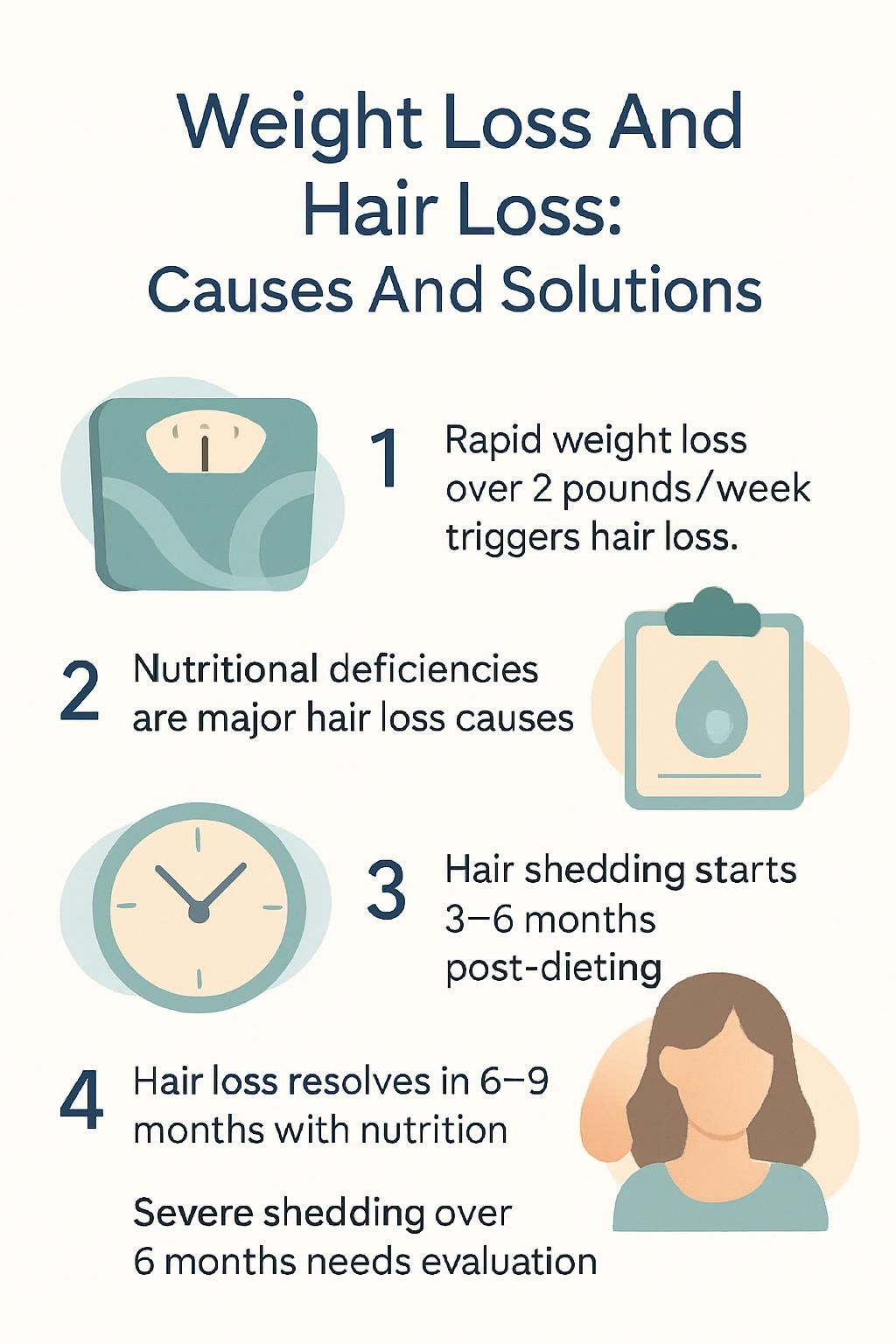Weight Loss And Hair Loss: Causes And Solutions
Our Nutrition Assistant AI Suite will transform your body. You will lose fat, get toned, and build muscle. Gain confidence and optimal health.
If you notice more hair on your brush while losing weight, you are not alone. Weight loss and hair loss can appear together, and it can feel frustrating or scary.
Rapid weight loss or eating too few nutrients can trigger extra shedding. This guide explains why hair loss can happen during a weight loss journey, what causes it, and how to prevent hair loss during weight changes.
Read on to learn simple steps that support a healthy weight and strong hair at the same time.
Key Takeaways
- Rapid weight loss, more than 2 pounds per week, can trigger telogen effluvium within 3 to 4 months. Up to 75% of women after bariatric surgery report shedding.
- Common nutritional deficiencies linked to hair loss include iron, zinc, protein, vitamin D, and biotin, especially during very restrictive diets.
- Most hair shedding starts 3 to 6 months after dieting and improves within 6 to 9 months once nutrition is corrected.
- Gentle hair care, less heat styling, more protein, and a daily multivitamin can lower risk during weight loss.
- Shedding that lasts more than six months needs medical evaluation to check for conditions such as thyroid disease or anemia.

How Are Weight Loss and Hair Loss Connected?

Losing weight can lead to hair loss through diet changes, body stress, and lack of key nutrients. Very-low-calorie plans can push the body into “survival mode.”
When that happens, nutrients are directed to vital organs first, not to hair growth. Hair becomes a lower priority.
Nutrient gaps are common with crash diets or after bariatric surgery, which is weight loss surgery. Lacking iron, zinc, protein, vitamin D, or biotin can cause noticeable thinning called telogen effluvium, a stress-related shedding.
I once dropped weight quickly and saw heavy shedding. Blood tests later showed low iron, and fixing it reduced my hair loss.
Knowing the causes helps you protect your strands before problems grow.
Causes of Hair Loss During Weight Loss
Hair loss during weight loss often comes from changes in diet and stress on the body. Understanding these causes can help you protect hair health while pursuing your goal weight.
How Do Nutritional Deficiencies Cause Hair Loss?
A shortage of essential vitamins and minerals can cause hair loss due to weight loss. Cutting calories may reduce iron, zinc, omega-3 fats, selenium, or vitamin D.
Iron deficiency anemia can also affect energy, mood, and heart health. People on strict diets often notice thinning or sudden hair fall.
If meals miss these nutrients, you may find extra strands in the brush. Hair follicles need steady nutrition to grow well. Without it, the body slows non-essential functions such as hair growth.
After unintentional weight loss, I noticed heavy shedding. My lab tests showed low zinc, which can push follicles into the telogen, or resting, phase too soon. Correcting the deficiency with food and supplements allowed slow regrowth.
Clinical studies support fixing proven deficiencies to support new hair growth. Supplements without a real deficiency do not show clear benefits.
Nutritional gaps during rapid weight loss can cause diffuse thinning until new hair cycles back in.
Why Does Rapid Weight Loss Lead to Hair Loss?
Rapid weight loss depletes fat and muscle quickly, which often creates nutrient gaps. The body reacts to protect vital organs, so fewer resources reach hair follicles.
Extra shedding often appears 3 to 4 months after quick weight loss. Telogen effluvium is the most common temporary type in this situation and usually lasts 6 to 9 months.
Dermatology guidance warns that losing more than 2 pounds per week raises the risk of shedding.
Your body prioritizes survival over healthy hair during rapid changes.
What Hormonal Changes Affect Hair Loss During Weight Loss?
Hormone shifts can affect hair during weight loss. After gastric bypass surgery or strict calorie restriction, hormone levels that support growth can drop.
These changes can push many hairs into the resting phase, a pattern called telogen effluvium. Triggers also include stopping birth control, major illness, or recovery from surgery.
Women often notice more shedding after childbirth due to estrogen changes. People who have bariatric procedures commonly see shedding 3 to 6 months later. During a period of fast weight loss and high stress, I saw thinner strands, which showed me how hormones matter.
How Does Stress from Rapid Weight Loss Impact Hair Health?
Rapid weight loss often stresses the body. That stress can cause telogen effluvium, a common shedding pattern after weight reduction.
The hair matrix, the area that helps hairs grow, needs a lot of energy. Stress may divert energy away, so more hair falls out during washing or brushing.
Stress-related shedding usually starts 2 to 3 months after the trigger. It often improves once calorie intake stabilizes, even without weight regain.
Losing more than 10% of body weight fast raises risk. Managing stress and keeping a balanced diet can protect hair during your weight loss journey.
Types of Hair Loss from Weight Reduction
Weight loss can lead to specific hair loss patterns. Knowing them helps you choose the right steps to support regrowth.
What Is Telogen Effluvium and How Does It Occur?
Telogen effluvium, often called TE, is a common cause of hair loss after weight loss. It usually appears 3 to 4 months after a stress event such as rapid dieting.
Shedding is diffuse, meaning it happens all over, and often lasts 6 to 9 months. Stress and low calories can push many follicles into the resting phase at once.
Doctors have tracked TE in people who lost a lot of weight. Onset often ranges from about 1 to 6 months after the weight change.
If you are shedding during a diet or after obesity surgery, TE may be the reason. Rapid diet shifts can affect metabolism and scalp health.
How Can You Identify Diffuse Hair Thinning?
Diffuse thinning shows as uniform hair loss across the scalp rather than patches. About 75% of women after sleeve gastrectomy reported this pattern within 3 to 4 months in a 2021 study.
You might see more hair on your pillow or in the drain. The American Academy of Dermatology notes normal shedding is about 50 to 100 hairs per day.
Your ponytail may feel thinner, or your part may look wider. I once saw my brush fill faster after a strict diet. My hair looked flatter everywhere, which matched telogen effluvium.
Spotting these changes early helps you talk with a professional and adjust your plan.
Next, see how sudden and gradual weight loss affect hair differently.
How Do Sudden and Gradual Weight Loss Affect Hair Differently?
Sudden weight loss, especially above about 3.5 kg per month, often leads to telogen effluvium due to shock to the system. Extreme restriction can cause nutrition gaps and hormone shifts that push follicles to shed.
Men often lose weight faster than women, so they may see earlier shedding. When I lost a large share of body weight quickly, I noticed extra shedding within a few months.
Gradual weight loss lets the body adapt and lowers risk. Older adults and women can still get TE with smaller changes, while teens may lose a higher percentage and face faster shedding.
A steady plan with protein, iron, and a multivitamin supports hair health during body changes.
How Long Does Hair Loss Last After Losing Weight?
Shedding often begins 3 to 6 months after weight loss. Telogen effluvium is the usual pattern and ties to stress or nutrient gaps.
Most people see shedding improve by 6 months. Regrowth often appears by 6 to 9 months after nutrition is fixed. Some studies report average recovery near 5 months, with wide variation.
The amount of weight lost does not always change the timing of loss or recovery. Focus on balanced nutrition and health habits to support hair growth.
If shedding is severe or keeps going, seek medical care to rule out thyroid disease, anemia, or malabsorption.
How Can You Reduce Hair Loss While Losing Weight?
Simple changes can lower shedding during a weight loss plan. The steps below focus on food, hydration, and healthy habits.
What Are the Best Nutrient-Rich Foods for Hair Health?
Choose iron and zinc rich foods to support hair growth. Good picks include eggs, shellfish, dairy, cashews, and spinach. Lean proteins such as chicken and turkey help build thicker hair.
Legumes like lentils and beans supply iron and protein with little fat. Whole grains, fruits, and vegetables provide folate and other key nutrients for follicles.
Fatty fish such as salmon or sardines provide omega-3 fats that hydrate the scalp and may calm inflammation linked to shedding. Nuts and seeds make easy snacks and support digestion during weight changes.
How Much Hydration Is Needed to Protect Hair?
Strong hair needs water too. Aim for at least eight glasses of water daily to support scalp health and follicle function.
After weight loss surgery, your hydration needs may increase due to changes in digestion. Adequate fluids help prevent dryness and breakage and support regrowth.
People who drink too little often notice a dry scalp and more shedding. Meeting these targets supports overall hair care during weight loss.
Why Should Extreme Dieting Be Avoided?
Severe calorie cuts can cause rapid weight loss and hair loss due to nutrient gaps. Crash diets often shortchange protein, iron, and key vitamins, which slows growth and increases shedding.
Low calorie intake can also stress your heart, muscles, and immune system. Some people report hair loss and fatigue after quick weight loss plans. Multivitamins can help, but they cannot fix a poor diet on their own.
Weight loss can be important for health, but it should be steady and balanced. Losing more than 2 pounds per week raises the chance of hair thinning. A moderate approach protects your health and your hair.
When Are Multivitamins Helpful for Hair Loss?
A daily multivitamin can fill common gaps linked to shedding, such as iron, zinc, vitamin D, and biotin. After gallbladder or bariatric surgery, some people absorb fewer nutrients and need a targeted plan.
A clinician or dietitian can guide the right formula for your needs. Many people report stronger hair after a supervised supplement plan during weight loss.
Use multivitamins as backup support if your routine meals fall short. Next, see how stress control helps reduce shedding.
How Can Managing Stress Reduce Hair Shedding?
Stress can push more hairs into the resting phase, which leads to telogen effluvium. Reducing stress helps normalize the growth cycle after weight changes.
Short daily walks, mindfulness, better sleep, or talking with a counselor can help. During college, I noticed more hair in the shower during high stress. After adding exercise and quiet time, shedding eased within a few months.
Lowering stress supports the body as it recovers from rapid changes in weight and calories.
Key Vitamins and Nutrients to Prevent Hair Loss
Your hair relies on several nutrients to grow well. These are the ones with the most impact.
How Does Biotin Help Hair Growth?
Biotin, or vitamin B7, helps your body build keratin, the main hair protein. Deficiency can slow growth and increase thinning during or after weight loss.
Doctors often suggest biotin when deficiency is proven. Some people use 2 to 5 mg daily under medical guidance. When I combined a daily biotin supplement with foods rich in B vitamins, my shedding slowed within a few months.
If hair loss is due to diet gaps, correcting those gaps can help before trying medicines such as minoxidil.
Why Is Iron Important for Healthy Hair?
Iron supports hemoglobin, which carries oxygen to hair follicles. Too little iron can make hair weak and brittle and is a common trigger after quick weight loss.
Iron deficiency anemia can also cause fatigue, infections, pregnancy complications, and low mood. Eating iron rich foods like spinach, beans, and lean red meat supports the hair growth cycle.
Monitoring iron during weight loss can reduce shedding and improve scalp comfort.
What Are the Benefits of Zinc for Hair?
Zinc helps follicles work properly and supports oil glands that condition each strand. A shortage can cause shedding, especially after weight loss surgery or strict dieting.
Many patients after bariatric surgery need zinc support. During one rapid weight loss period, I added a multivitamin with zinc under medical advice and saw less shedding within two months.
How Does Vitamin D Support Hair Health?
Vitamin D helps activate follicles and supports the growth phase. Low levels are linked with more cases of telogen effluvium, especially after rapid weight loss.
You can get vitamin D from sun exposure, fortified foods, and supplements. Checking your level during diet changes can help prevent problems such as severe shedding.
Why Are Omega-3 Fatty Acids Good for Hair?
Omega-3 fats help the scalp make natural oils that keep hair soft. They may also calm inflammation around follicles, which supports growth.
Foods like salmon, chia seeds, and walnuts are good sources. If your diet limits these foods, ask about fish oil or plant-based omega-3 supplements.
How to Address Hair Loss After Weight Loss
You can address hair loss after weight loss with therapy, key nutrients, and smart hair care. The steps below offer a practical plan.
When Should You Consult a Health Professional?
See a professional if shedding lasts longer than six months. Seek help sooner if you also have fatigue, scalp pain, or changes to nails and skin.
Ask for tests for thyroid disease, iron deficiency, vitamin D deficiency, or other causes. If you plan bariatric surgery, meet with your doctor to prepare a nutrition plan.
Finding the cause early leads to better results. In some cases, a dermatologist or hair specialist may be helpful.
How Can Increasing Protein Intake Help Hair?
Hair is made of keratin, a protein. Eating enough protein from lean meats, fish, eggs, tofu, and legumes supports the growth cycle.
Adults generally need at least 0.8 grams of protein per kilogram of body weight daily. After I increased protein during a weight loss phase, my hair looked fuller within three months.
Meeting protein goals protects against loss of active growing hairs and supports the return of thicker strands.
What Supplements Are Necessary for Hair Recovery?
After fixing protein intake, focus on proven nutrient gaps. Supplements may help when blood tests show low iron, zinc, vitamin D, or biotin.
Biotin supports keratin production. Iron supports oxygen delivery. Zinc helps cell repair and follicle health. A clinician can tailor doses to your needs.
Target only confirmed deficiencies. Unneeded supplements may not help and can cause side effects. Some people also use lysine to assist iron absorption or inositol for general hair wellness.
What Are Effective Hair Care Practices?
Daily care choices matter while your hair recovers. Use the checklist below to reduce breakage and support regrowth.
- Use gentle shampoos without sulfates or strong fragrances to avoid stripping natural oils.
- Avoid frequent heat styling with straighteners or curling irons to lower breakage risk.
- Moisturize the scalp with light oils such as argan or coconut oil a few times per week.
- Detangle with a wide-tooth comb and avoid tugging to protect fragile strands.
- Choose loose styles and skip tight ponytails or braids to reduce traction on roots.
- Limit washing to two or three times per week unless a dermatologist advises otherwise.
- Towel-dry by patting with a soft towel instead of rubbing to prevent breakage.
- Keep the scalp clean but do not overuse clarifying products that can dry hair.
- Massage the scalp for a few minutes daily to boost blood flow to follicles.
- Use lightweight leave-in conditioners with supportive ingredients such as biotin or omega-3s.
- Avoid high alcohol content products that dry the scalp and make thinning more obvious.
When Should You Consider Hair Loss Treatments?
If shedding is severe or you see bald patches that do not improve with nutrition, consider treatments such as minoxidil or low-level laser therapy. Starting early may help if shedding lingers beyond six months after fixing deficiencies.
Talk with a healthcare professional before using over-the-counter solutions. A medical review can rule out thyroid disease, anemia, or other causes and guide a safe plan.
What Hair Care Tips Help During Weight Loss?
Gentle hair care protects fragile strands while you work toward your goal. Use these tips to support a healthy scalp.
How to Choose Gentle Shampoos?
Pick shampoos free of sulfates and parabens. Sulfates strip natural oils and can dry hair. Parabens and heavy fragrances may irritate sensitive skin.
Check the label and avoid sodium lauryl sulfate and sodium laureth sulfate. Choose products with mild cleansers and soothing ingredients such as aloe vera or chamomile.
Dermatologists often recommend fragrance-free formulas for irritated scalps. A gentle shampoo keeps hair clean without extra damage.
Why Limit Heat Styling During Weight Loss?
High heat weakens hair shafts and worsens breakage. During weight loss, hair can be more fragile due to nutrient gaps.
Reduce blow-drying, flat ironing, and hot curling. Air-dry when possible. I saw less breakage after cutting back on heat during a major weight loss phase.
Lower heat helps hair keep moisture and protein, both important for strength and bounce.
How to Properly Moisturize Your Scalp?
Apply a small amount of lightweight oil or a gentle conditioner to the scalp. Jojoba or argan oils work well and are less likely to clog pores.
Massage twice a week to hydrate skin and create a healthy base for new growth. During a fast weight loss period, using a fragrance-free conditioner eased my dry, itchy scalp and reduced brittleness.
Moisturizing supports comfort and improves the look of thinning hair.
How to Manage Thinning Hair After Weight Loss
Thinning hair can be managed with daily habits and proven tools. A simple routine can improve both comfort and confidence.
What Are the Benefits of Scalp Massages?
Scalp massage can increase blood flow to follicles. Better circulation delivers more oxygen and nutrients to support growth.
This practice may also reduce tension and stress. Many people notice softer hair after five minutes of gentle massage each day. It pairs well with other evidence-based steps during recovery.
How Does Minoxidil Work for Hair Loss?
Minoxidil is a topical liquid or foam for thinning areas. It increases blood flow to follicles and can restart growth in some people.
Use as directed for several months to see results. If you have irritation or no progress after six months, speak with a clinician.
Which Hair Thickening Products Are Effective?
Choose shampoos and conditioners made for fine or thinning hair. Many include keratin, biotin, or panthenol, which coat strands and make hair look fuller.
Lightweight volumizing sprays or mousses add body without buildup. Avoid heavy silicones and harsh sulfates that can weigh hair down or irritate the scalp.
Some product lines tested by dermatology teams offer gentle thickening options. I used a light mousse during post-diet shedding and saw instant lift without greasiness.
When Should You See a Healthcare Provider?
If shedding seems unusual after weight loss, a healthcare provider can help you find the cause and plan next steps.
What to Do About Persistent Hair Shedding?
Shedding that continues beyond 6 to 9 months should be evaluated. Underlying problems such as thyroid disorders or iron deficiency anemia may be present.
Ask for blood tests and a diet review. A professional may adjust your nutrition plan, suggest supplements, or recommend treatments.
During my own long shedding phase, low vitamin D and iron were found. After correcting them, new growth appeared within a few months.
Early action helps prevent further thinning and guides effective care.
What Symptoms Indicate Serious Health Issues?
Watch for red flags. Persistent fatigue, frequent infections, chest pain, rapid heartbeat, headaches, new digestive issues, or muscle weakness deserve prompt care, especially if hair loss is present.
These symptoms can signal iron deficiency, low immunity, or other medical concerns. Healthy weight loss should not cause ongoing illness.
Seeking timely care protects both your health and long-term hair growth.
Conclusion
Weight loss and hair loss can occur together, but you can take control. Focus on balanced nutrition, steady hydration, and a moderate pace to protect hair health.
Schedule a checkup if shedding is heavy or persistent. Gentle hair care and professional support, including options through centers such as Texoma Care Weight Loss Surgery Center, help many people improve over time.
With patience and healthy habits, most people see hair regrowth while maintaining a stable weight. This article is for education only and does not replace medical advice. For diagnosis or treatment, consult a qualified clinician.
FAQs
1. What causes hair loss during weight loss?
Rapid reduction in body weight can lead to hair shedding. This often happens when the body does not get enough nutrients, such as protein, iron, or certain vitamins. Research shows that low-calorie diets and sudden dietary changes can trigger a condition called telogen effluvium, where more hair enters the shedding phase. A study published in the Journal of Clinical and Diagnostic Research found that 35 percent of people who lost weight quickly experienced temporary hair loss.
2. How can I prevent hair loss while losing weight?
Eating a balanced diet with enough protein, iron, zinc, and vitamins helps protect hair health. Gradual weight reduction, rather than extreme calorie cuts, lowers the risk of hair shedding. According to the Academy of Nutrition and Dietetics, aiming for a loss of one to two pounds per week supports both healthy weight and hair. My own experience with slow, steady weight reduction helped me keep my hair healthy while reaching my goals.
3. Can hair loss from weight loss be reversed?
Most hair shedding from weight reduction is temporary. Once the body receives enough nutrients and stress levels decrease, hair usually grows back within six months. A review in Dermatology Practical & Conceptual notes that hair regrowth often starts once nutritional needs are met. Consistent healthy eating and stress management support recovery.
4. What are the best solutions for hair loss related to weight loss?
The best solutions include eating a nutrient-rich diet, managing stress, and avoiding crash diets. Some people benefit from supplements if a doctor finds a deficiency. Regular checkups help monitor progress. In my case, adding more iron-rich foods and practicing stress relief techniques improved my hair health.
Summary: Rapid weight reduction, poor nutrition, and stress can cause hair shedding. Eating a balanced diet, losing weight slowly, and managing stress are key steps for prevention and recovery. Most people see improvement with these changes.







